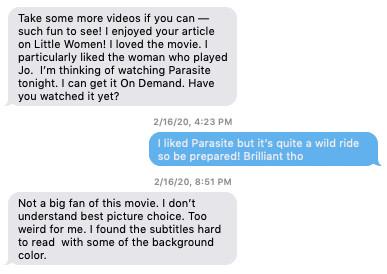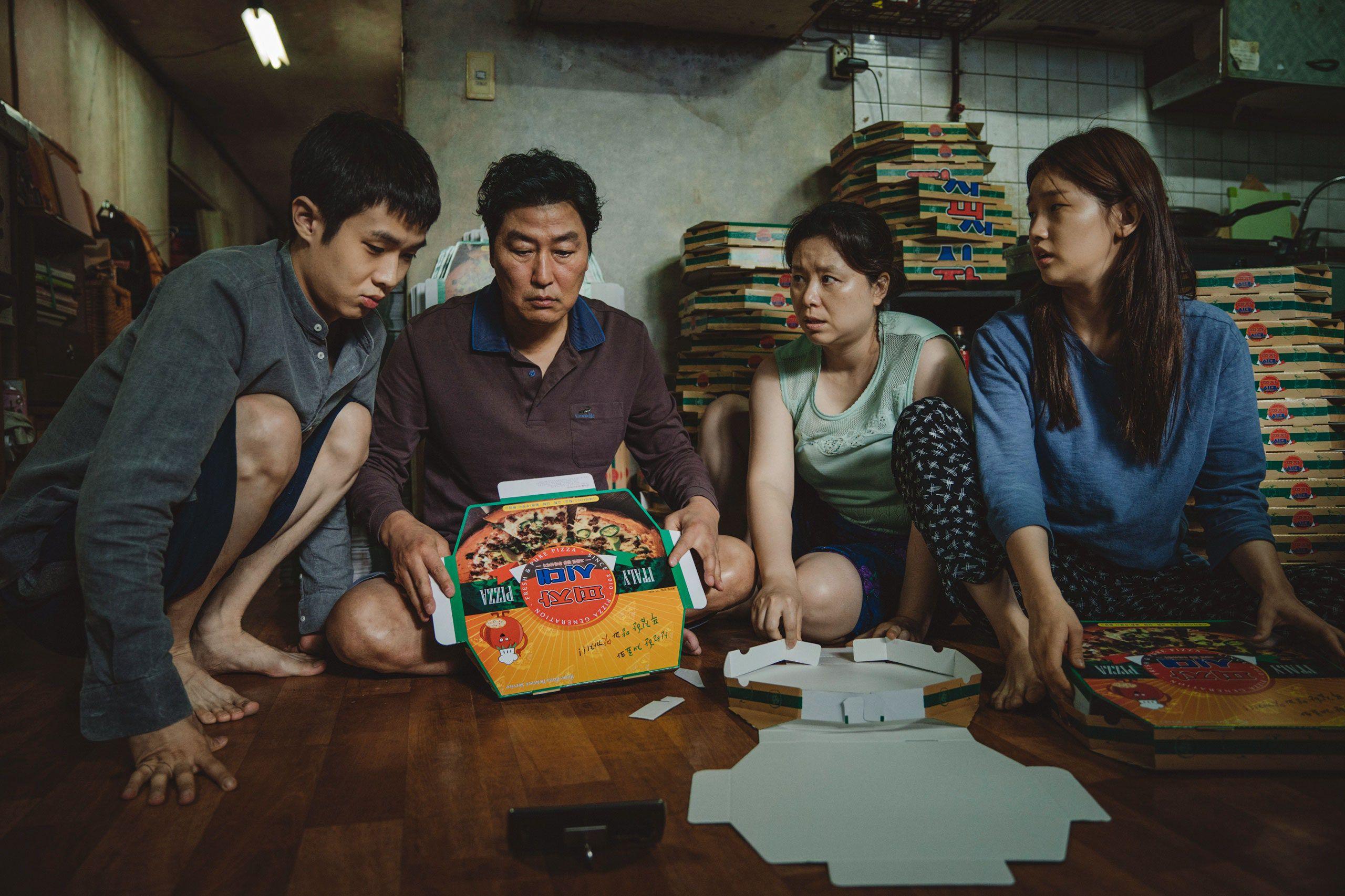When Parasite won Best Picture at the Oscars in February, the feeling was, “Finally, they got it right.” Bong Joon-ho’s knotty thriller about class is an expertly made movie—carefully plotted, impeccably styled, devastatingly poignant and timely. It might’ve even deserved more awards. Alas. At least the movie is now streaming on Hulu so that we can talk about it all over again.
1. What is your tweet-length review of Parasite?
Rob Mahoney: Parasite is one of the most engrossing capers ever made—the kind that will excite you, make you kind of regret feeling excited, and then force you to consider it all.
Miles Surrey: Isn’t it cool when the Best Picture winner actually ends up being one of the best films of the year—and in this case, the decade?
Andrew Gruttadaro: I’ll never look at a flickering light the same.
Michael Baumann: By far the best-directed movie of 2019 that I saw, and worthy of its four Oscars, but man … none of the actors even got nominated? As much as I loved the writing and direction, the acting really put it over the top.
Katie Baker: I’ll share my mom’s tweet-length review:

2. What was the best moment of the film?
Gruttadaro: Say it with me: JESSICA. ONLY CHILD. ILLINOIS, CHICAGO.
Baumann: “Jessica. Only child. Illinois, Chicago.”
Mahoney: The dual-track infiltration of the Park house. More a set of elaborate, interlocking scenes than a moment, but Parasite really kicks into gear when Ki-woo brings his sister—“Jessica,” only child, Illinois, Chicago—to pose as an art teacher for the Parks’ young son. As Jessica, Ki-jung takes control of the entire house with nothing but grade-A bullshit and withering severity.
Baker: I loved seeing all the family members worm their way into the Park home; it was like watching the getting-the-gang-together scenes at the start of the various Ocean’s movies, and also D2: The Mighty Ducks. Was also a big fan of every moment when the mom speaks in English, you know what I mean?
Surrey: The basement reveal and ensuing chaos before the Park family returns is when Parasite goes from being a very good movie to something truly special. It’s an amazing realization on first viewing.
3. What was your least favorite part of the movie?
Mahoney: I don’t understand the question and I won’t respond to it.
Surrey: There’s a brief moment when Kim Chung-sook kicks away the Parks’ dogs that was upsetting—it’s not the animals’ fault they have rich owners!
Baumann: I don’t know if this is the product of watching at home, with a clock on my cable box, after only being 98 percent successful in avoiding spoilers, but it felt about 15 minutes too long.
Gruttadaro: The climactic scene when everything goes violent is so brutal and emotionally upsetting—Ki-jung dying is just the worst—but it’s also the one scene in the movie that my brain refuses to suspend disbelief for. And so while it’s an effective scene, it also took me out of the movie a bit.
Baker: Didn’t love watching the sheltered 15-year-old girl making out with the scheming college-age boy, so I guess now I understand where my parents were coming from.
4. Let’s go to the basement to talk about THAT twist.
Gruttadaro: Blissful, batshit chaos.
Baumann: Very clever, but also very stressful for someone who’s afraid of falling down stairs.
Mahoney: The best twists aren’t really twists, so much as things carefully hidden inside another, completely different movie. There’s really no more energizing feeling as a viewer than to realize an entirely different story was running just out of frame. It’s not hyperbole to say Parasite’s twist makes the movie—not just on surprise, but on the substance the basement adds to the dynamic between all the other characters in the story.
Baker: It’s thrilling and terrifying to watch something or someone completely disintegrate before your eyes, and seeing the Kim family’s blissful weekend fall apart like a cardboard box in the rain was stressful but also weirdly satisfying. Parasite is a movie that ultimately features gore, but its most horror-film moment is a simple, bloodless one: Whatever you do, DON’T ANSWER THE DOOR!
Surrey: Watching Parasite for a second (and third, and fourth) time, it’s clear this film is a better companion to Jordan Peele’s Us than something like Knives Out. An Us-Parasite double feature would be an extremely stressful time, but definitely worthwhile and thought-provoking.
5. How did you initially react to the Kim family’s plot on the Park family? And what does that reaction say about you?
Surrey: I was relishing it, though I did feel bad for the original housekeeper. (Peaches are really having a cinematic moment.) Still, I think the fact that I didn’t spare a thought for the Park family is further proof that I’m Feeling the Bern.
Mahoney: Personally, I find it impossible not to be charmed by it. A good con takes everything we love about watching the smartest people in a room and raises the stakes and tensions. And in this case: family bonding! Ki-taek glows as he admires his daughter’s forgery and his son’s deceptions. When the Kims finally get the run of the house for a few hours, Parasite damn near turns into Ferris Bueller’s Day Off, or the library dance break in The Breakfast Club—people behaving badly in the dress of a good hang. We’re all suckers for a good story, and the Kims play us just as shrewdly as they do the Parks.
Baumann: I object to characterizing the Kims’ actions as a “plot.” Apart from Ki-jung, everyone was doing precisely the job they were hired to do. (And even then, art is a scam in general, so the Parks were really getting what they paid for anyway.) This is just using personal connections to get a job you’re not qualified for—anyone who works in media should know better than to think that’s somehow extraordinary.
Baker: The first time I sat down to watch Parasite, I got about halfway through before my kids woke up from their nap, and weeks elapsed before I sat back down to finish. Those were some lovely and innocent weeks, in which I thought of Parasite as basically a witty and darkly comedic petite crime romp. I assumed that the rest of the film would just be everyone getting into and out of grandly-yet-tightly choreographed jams. Which, I mean, I guess I was right …?

6. Who is Parasite’s most valuable player?
Surrey: Bong Joon-ho. One of the best things Parasite’s done is bring Bong closer to being a household name (and nab him a couple of Oscars along the way). Bong is a living legend, the new Spielberg, and as incredible as Parasite is, I’d argue it isn’t even his finest achievement. Go watch Memories of Murder ASAP. It’s one of the best films ever made, and it might have the best ending of all time.
Baumann: Ki-jung. Every group of ordinary people that gets pushed into an extraordinary situation has a wild card, and this whole enterprise would have ended somewhere between inappropriate teacher-student interaction and four people dying if Ki-jung weren’t so quick on her feet.
Baker: Jessica, only child, Illinois, Chicago!
Gruttadaro: In terms of the story itself, Ki-woo is the MVP, a resourceful, Morse code–reading son of a gun with a breezy temperament that’s charming as hell. He’s the glue guy and a facilitator, but he’s also probably getting the most buckets. In terms of performances, Song Kang-ho and Jo Yeo-jeong deliver perfect ones—the former as a brusque, partially broken father, the latter as a delightfully blithe, unaware rich lady.
Mahoney: Jo Yeo-jeong as Mrs. Park. “How should I describe the mother ...? She’s a bit simple. Young and simple,” we’re first told—but her role in all this is anything but. What makes Parasite really click is the incredible credulity of Yeo-jeong’s performance, and the doting naivete of her character. In almost every scene she’s in, Mrs. Park is getting played, fleeced, incepted, and bossed around. Yet she so urgently walks into every trap, largely out of well-meaning concern for her children. It is a performance of perfectly modulated wide-eyed surprise. The audience is on the hook because Mrs. Park is on the hook; Parasite turns on the idea that the Kims have control of the Park household long before they’ve fully cracked it—an idea that could be sold on Yeo-jeong’s reactions alone. One of the film’s most devastating moments plays out almost entirely on her face.
7. How do you feel about the movie’s epilogue?
Baker: “Epilogue” is a much gentler term than how Bong Joon-ho described his final scene—as a “surefire kill.” I wanted to believe that the turtleneck was real, but the last shot of Ki-woo in his gloomy basement was a reminder that nope, it’s just turtles all the way down.
Mahoney: It’s a perfect fit. What better way to end Parasite than with the empty, impossible dream of finally climbing out of the basement?
Gruttadaro: It’s beautiful, sad, and also darkly instructive—even in Ki-woo’s fantasy, the only real way to get what the Parks have is to become them.
Surrey: Appropriately forlorn, and better than the alternative of Kim Ki-woo actually getting rich enough to free his dad. Sorry, Mr. Kim, that would’ve been a cop-out.
8. Rank 2019’s “Eat the Rich” movies.
Gruttadaro: It goes: Parasite, Knives Out, Hustlers, and then Ready or Not, a movie I have not seen but that I assume does not come close to touching that Holy Trinity.
Baker:
1. Hustlers
2. Parasite
3. Uncut Gems (OK, fine, that’s probably more like “Cheat the Rich”)
4. Knives Out
Mahoney:
1. Parasite
2. Knives Out
3. Hustlers
But honorable mention to Ready or Not!
Baumann: No 2019 movie made me hate the rich as much as Star Wars: The Rise of Skywalker. Well, maybe not rich people in general so much as J.J. Abrams specifically …
Surrey:
1. Parasite
2. Knives Out
3. Ready or Not
4. Literally anything else
5. Joker
9. A Parasite TV series is in the works—what would you like to see the show expand on?
Surrey: If we’re being honest, it’d be better if the series never happened. Why mess with perfection?
Gruttadaro: If it must happen, give me an entire first season on the basement guy’s Taiwanese bakery.
Baumann: The works of the legendary architect Namgoong, also played by Song Kang-ho, in a reprise of his starring role in Snowpiercer.
Baker: I want to delve into Min-hyuk’s scene; it kinda seems like he’d be into some real sicko shit while also swanning through society in just the right way. What are his university buddies like? Is he ever in touch with Yeon Kyo or Da Hye? How many blazers hang in his closet and how many metaphorical gifts does he give? “Min would never be in this situation,” Ki-jung yells in Parasite, but what I’d like the TV series to answer is the question: or would he?
Mahoney: The quiet achievement of Parasite is its pacing. Bong Joon-ho tracked the story to build steam so quickly that it can afford to blow some off, too—taking the air out of a tense moment with a great bit or a clever joke, even if the punch line turns acidic by the film’s end. You can’t quite replicate that rhythm in a series format. Instead, you have the room to indulge with a bit more diversion. You could spend an entire episode on Geun-sae’s failing bakery and creeping debt, expanding on the sociocultural subtext that keeps people below ground. You could follow Moon-gwang after she’s fired as the Parks’ housekeeper via peach fuzz. It’s important to the story that the Kims be our point-of-view characters, but a well-placed detour could give the series an added element the movie version of Parasite didn’t need or have room for.
